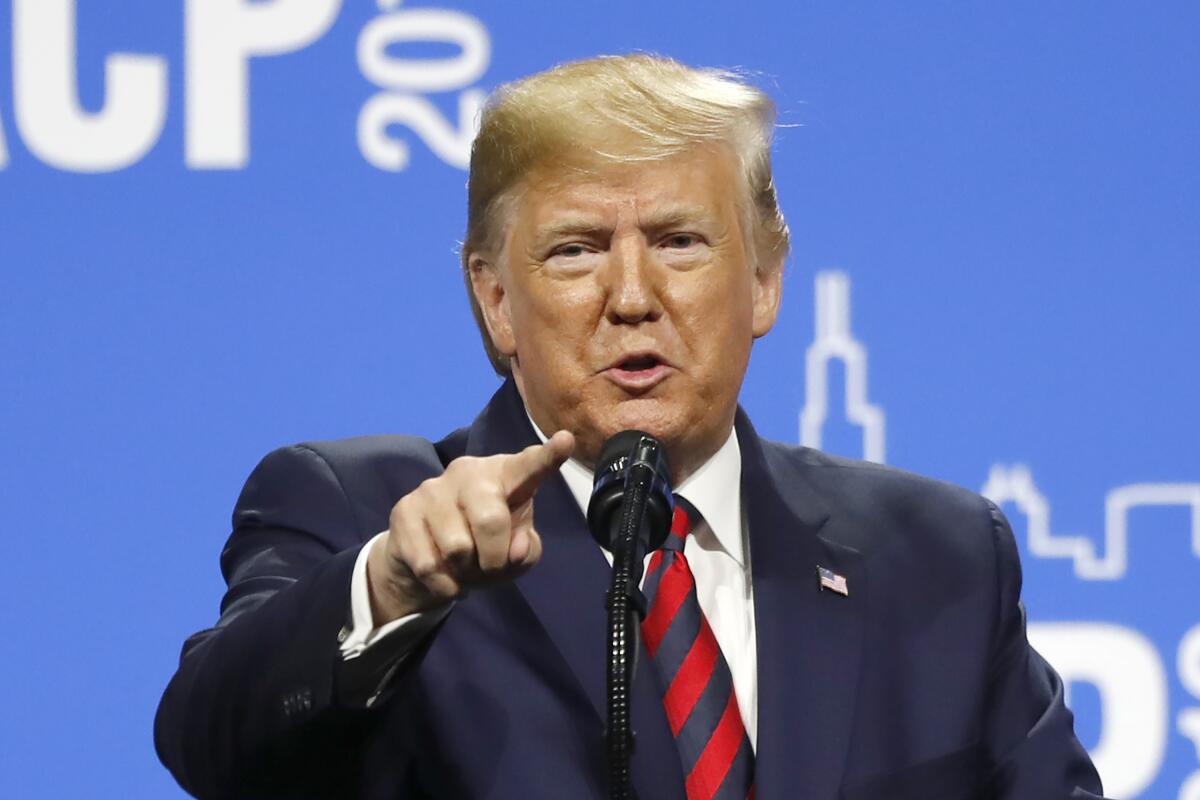California justices skeptical of law requiring Trump to release tax returns for primary

- Share via
California’s top court appeared skeptical Wednesday that the Legislature may require presidential primary candidates to disclose not only their tax returns but also their birth certificates and psychiatric records.
During a hearing on a new law requiring presidential primary candidates to produce their tax records, a lawyer representing the state argued the Legislature had the power to impose all sorts of requirements. Though some justices appeared inclined to find some support for the new law, no one on the court embraced the notion that the Legislature had unfettered power.
Deputy Atty. Gen. Jay C. Russell, defending the law, spoke of its expansiveness in response to a question from Justice Joshua Groban.
“Would the Legislature be entitled to impose requirements that candidates produce birth certificate or psychotherapy records or affidavits that they have never committed adultery or been a member of the Communist Party?” Groban asked.
Russell said yes, under the text of a state law, “the Legislature does have plenary power to regulate primary elections.”
He noted, though, that some requirements could run afoul of privacy protections embodied in the state and federal constitutions.
“The Legislature can then tack on any number of additional requirements?” asked an incredulous Justice Ming W. Chin.
“Where does it end?” Chin asked. “Do we get all their high school report cards?”
Even justices whose questions suggested an openness to the tax returns requirement indicated there had to be some limits.
Justice Goodwin Liu told Russell that he seemed to be espousing “a very strange reading” of the law.
Justice Mariano-Florentino Cuéllar suggested that a less expansive reading of the law might have been “enough to win your case.”
In the case before the court, the California Republican Party argued the law violated the California Constitution, which since 1972 has called for an open presidential primary.
Chief Justice Tani Cantil-Sakauye said the Legislature had not even considered the state Constitution in drafting the law.
The Legislature has plenary power “until the Constitution speaks,” she said. She said the court searched the records to determine if the Legislature even consulted the state Constitution.
“We didn’t find anything,” she said. “Did you?”
Even if the state high court upheld the law, it could not be enforced under an order by Sacramento-based U.S. District Judge Morrison C. England Jr.
England ruled in September that the law violated four different sections of the U.S. Constitution in addition to a separate federal law. The state appealed his ruling to the U.S. 9th Circuit Court of Appeals, which is not likely to decide the case before the deadline for producing tax returns.
Federal courts have the last word on matters of federal law, and the California Supreme Court has the final say on state law issues. If either court blocks the law, it cannot take effect.
In a separate case, a federal appeals court in New York decided earlier this week that Trump’s accountants must turn over his tax returns to a grand jury investigating possible illegal conduct by the president. The Trump administration has said it would appeal that ruling to the U.S. Supreme Court.
More to Read
Sign up for Essential California
The most important California stories and recommendations in your inbox every morning.
You may occasionally receive promotional content from the Los Angeles Times.











